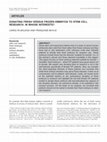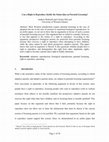Articles by Carolyn McLeod

Some stem cell researchers believe that it is easier to derive human embryonic stem cells from fr... more Some stem cell researchers believe that it is easier to derive human embryonic stem cells from fresh rather than frozen embryos and they have had in vitro fertilization (IVF) clinicians invite their infertility patients to donate their fresh embryos for research use. These embryos include those that are deemed 'suitable for transfer' (i.e. to the woman's uterus) and those deemed unsuitable in this regard. This paper focuses on fresh embryos deemed suitable for transfer – hereafter 'fresh embryos' – which IVF patients have good reason not to donate. We explain why donating them to research is not in the self-interests specifically of female IVF patients. Next, we consider the other-regarding interests of these patients and conclude that while fresh embryo donation may serve those interests, it does so at unnecessary cost to patients' self-interests. Lastly, we review some of the potential barriers to the autonomous donation of fresh embryos to research and highlight the risk that female IVF patients invited to donate these embryos will misunderstand key aspects of the donation decision, be coerced to donate, or be exploited in the consent process. On the basis of our analysis, we conclude that patients should not be asked to donate their fresh embryos to stem cell research.
Papers by Carolyn McLeod
Journal of Medical Ethics

Conscience in Reproductive Health Care
The central claims of Chapter 5 are that health care professionals who serve a gatekeeping role a... more The central claims of Chapter 5 are that health care professionals who serve a gatekeeping role are fiduciaries for their patients (normatively speaking), they therefore have a fiduciary duty of loyalty to them, and this duty prohibits them from making typical conscientious refusals because doing so jeopardizes health interests of their patients. This chapter explains why this argument works even though typical objectors tend to view the fetus or embryo whose life is at risk as their second patient. At the same time, the author agrees that making a referral to a colleague who is willing and able to provide the offending service, rather than providing it oneself, can be a morally appropriate option for a conscientious objector. The chapter as a whole defends the approach to typical refusals of prioritizing patient interests, specifically for cases where the objector and patient have an existing fiduciary relationship. The author also extends her analysis to atypical refusals in repro...

Choice Reviews Online
Nationai übmy 1*1 ~€ C û t~d a Bibliothèque nationaie du Canada Acquisitions and Acquisitions et ... more Nationai übmy 1*1 ~€ C û t~d a Bibliothèque nationaie du Canada Acquisitions and Acquisitions et Bibtiogrsphic Çeivicea seMces bibliographiques 395 Wellington Street 395. nie WelTmgton OtEawrtON KfAON4 ûttawaON KIA O N 4 Canada Canada The author has granted a non-L'autem a accordé une licence non exclusive licence aüowing the exclusive permettant à la National L i b q of Canada to Bibliothèqne nationaIe du Canada de reproduce, loan, distnaate or seil reproduire, prêter, distribuer ou copies of this thesis in microform, vendre des copies de cette thèse sous paper or electronic fonnats. la forme de microfiche/nlm, de reproduction sm papier ou sur format électronique. The author retown-of the L'auteur conseme la propriété du copyright in this thesis. Neither the droit d'auteur qui protège cette thèse. thesis nor substantial exûacts fiom it Ni la thése ni des extraits substantieIs may be printed or othhse de ce11e-ci ne doivent être imprimés reproduced without the author's on autrement reproduits sans son permission. autorisation.
IJFAB: International Journal of Feminist Approaches to Bioethics
Debate has raged in Canada recently over whether in vitro fertilization (IVF) should be funded th... more Debate has raged in Canada recently over whether in vitro fertilization (IVF) should be funded through public health insurance. Such a move would require that the provinces classify IVF as a medically necessary service. In this paper, I defend the position I have taken publiclyespecially in Ontario, my own province-that IVF is not medically necessary. I contend that, by funding IVF on grounds of medical necessity, governments like Ontario's violate their commitments to equality and fairness, and cause harm. They do the last by suggesting that the lives of people who forgo procreation, and perhaps have children in other ways (e.g., through adoption), will be stunted.
IJFAB: International Journal of Feminist Approaches to Bioethics
In the past, the Hague Conference on Private International Law has shaped how people can become t... more In the past, the Hague Conference on Private International Law has shaped how people can become the legal parents of children born in countries other than their own. It did so by creating the 1993 Hague Convention on Intercountry Adoption. It is now interested in developing a convention on international contract pregnancy (or what many call surrogacy). We discuss in this commentary what such a convention would have to include for it to be ethically consistent with the Convention on Adoption.

Canadian Journal of Philosophy, 2002
Kant discussed the moral wrong of treating people as mere means or as a means only. To treat peop... more Kant discussed the moral wrong of treating people as mere means or as a means only. To treat people as means is to treat them as objects for our use. It is to objectify them. To treat people as a mere means is to treat them wholly as objects, rather than partially so. It is to have an objectifying manner that is absolute or unmitigated. Whether Kant meant to suggest that we commit a moral wrong only when we treat people as means absolutely, rather than partially, is debatable. My concern is with how feminist theorists writing on the objectification of women have followed Kant in emphasizing the extreme case of the mere means. These feminists have implied that the moral wrong of objectification occurs only with absolute objectification, as though between it and respecting someone's autonomy there were no degrees of objectification that are morally suspect.The relevant feminist work centres on such topics as women's reproductive freedom, their sexual freedom, and gender equity...

Canadian Journal of Philosophy, 2005
1)‘“Be true to yourself!” and “Don't cave in!” express the value people place on [_]….’2)‘… a... more 1)‘“Be true to yourself!” and “Don't cave in!” express the value people place on [_]….’2)‘… an important sense of [_] is being true to oneself.’3)‘[_] encourages and protects people's general capacity to lead their lives out of a distinctive sense of their own character, a sense of what is important to and for them. ’4)‘… to value [_] is to place value on an agent's acting from herreasons, whether they are good ones or not.’Quiz: fill in the blanks. Here is a hint: two are autonomy and two are integrity. Can you sort out which ones are which? I suspect not, especially since the first two are nearly identical but have different answers. The third seems clearly to be integrity, at least given what philosophers such as Bernard Williams write about integrity: that it involves preserving one's own distinct character. However, the answer to 3) is autonomy. The fourth quotation brings to mind discussions about how autonomous agents can make bad choices, but we respect their...
Oxford Handbooks Online, 2009
Health Law Review, Jun 22, 2013
This book review is not available online here. If you are affiliated with The University of Weste... more This book review is not available online here. If you are affiliated with The University of Western Ontario, please use the Shared Library Catalogue's Classic Search to check whether the journal in which this book review was published is available in Western Libraries. If you are not ...
Join My Mailing List. Carolyn McLeod. The University of Western Ontario. ... Bookmark. Other Publ... more Join My Mailing List. Carolyn McLeod. The University of Western Ontario. ... Bookmark. Other Publications «Previous Next». Standing on Guard for Women's Health: A Report from Canada.Carolyn McLeod, The University of Western Ontario. Suggested Citation. Carolyn McLeod. ...
Canadian Journal of Philosophy Supplementary Volume, 2002
Published as a book chapter in: Feminist Moral Philosophy, which is Supplementary Volume 28 of Ca... more Published as a book chapter in: Feminist Moral Philosophy, which is Supplementary Volume 28 of Canadian Journal of Philosophy. The book is not available online here. If you are affiliated with The University of Western Ontario, please use the Shared Library Catalogue's ...

The Morality of Procreation and Parenting, 2015
Most Western jurisdictions require parental licensing in the case of adoption but not in the case... more Most Western jurisdictions require parental licensing in the case of adoption but not in the case of assisted or unassisted biological reproduction. In an earlier paper, we set out to show that no arguments in favour of such a system of parental licensing succeed. One argument that we failed to consider, however, is one that appeals to the notion of a right to reproduce. According to this argument, prospective biological parents are protected from parental licensing because they exercise a right to reproduce when attempting to have children, while the same cannot be said about prospective adoptive parents. This paper shows that such an argument is flawed. It also questions whether people have a right to reproduce, and distinguishes this right from other, legitimate, rights, such a right to become a parent and a right to bodily autonomy.
Uploads
Articles by Carolyn McLeod
Papers by Carolyn McLeod